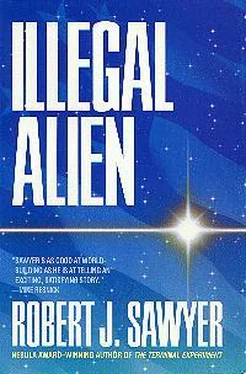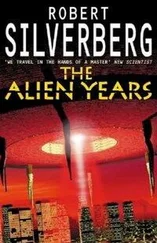“Despite the Tosok taboo about such matters?”
“We view the internal workings of the body the way you view sexual intercourse. They are private matters, but at appropriate times they can be appropriately explored. Given that five individuals are involved in Tosok mating, we have no privacy taboos associated with that act, and I assure you, Ms. Ziegler, that human embarrassment over sexual matters seems as strange to us as our reticence about interior biology is to you.”
“Understood,” said Ziegler. “When Hask was confronted with the task of harvesting Seltar’s organs, this would have been his first time performing such a procedure on an actual corpse, no? His training would have been done on simulations or dummies, correct?”
“Objection, Your Honor,” said Dale. “Compound question.”
“Sustained.”
“To your knowledge,” said Ziegler, “Hask would never have dissected in actual corpse before?”
“Object to the term ‘dissected.’ Inflammatory.”
“Sustained.”
“To your knowledge, Hask would never have removed organs from a real body before, correct?”
The clock whirred again. Someone coughed in the back of the courtroom.
“Correct.”
Ziegler locked her gaze on the alien captain. “Is it conceivable that Hask took pleasure in this act?”
“Objection! Calls for speculation.”
“Sustained.”
“Very well. As leader of your expedition, you no doubt received training in psychology, correct?”
“Correct.”
“Tosok psychology, right?”
“Yes.”
“So you are qualified as an expert in this area—more so than any human psychologist?”
“Yes.”
“And of all your crew, you’ve had the most psychological training?”
“Your Honor,” said Dale, spreading his arms. “Objection. Ms. Ziegler has tried this same stunt before. We’ve got no way to verify any of this. Surely the Court can’t rely on such opinions.”
“The People are not asking you to accept Kelkad’s opinions, Your Honor,” said Ziegler, “but the Tosoks are the only witnesses who can offer any sort of testimony in these areas. To that extent, these are factual matters, not matters of opinion, and they are clearly probative.”
“Normally I wouldn’t allow it,” said Pringle, “but, Mr. Rice, I’ll give you similar latitude should you wish to pursue similar lines of questioning during your case-in-chief.”
“Thank you,” said Ziegler. “Kelkad, as an expert in Tosok psychology, let me ask you a hypothetical question. Given the taboos surrounding internal bodily processes in your culture, is it conceivable that a Tosok could find pleasure in performing organ extraction?”
“Not a normal Tosok.”
“No, not a normal Tosok,” said Ziegler. “But in the annals of Tosok psychology, have there been cases of aberrant individuals taking pleasure in carving into other people’s bodies?”
Kelkad said nothing.
“Come now, Kelkad. I realize you’re trying to put the best foot forward for your people, just as our race has been trying to portray itself positively in your eyes. There are human beings who take pleasure in such matters. We consider it sick and deviant, and it is mercifully rare, but such human beings do exist. Are you telling me that no such Tosoks exist?”
“They exist,” said Kelkad slowly.
“In Tosok psychology, are there predictive tests for such a predilection?”
“I do not understand the question.”
“I mean, how is it that you discover that a Tosok has this particular aberration? Can you determine it just by looking at the Tosok?”
“No.”
“Would a normal Tosok psychological test—say, the kind your crew might have undergone before being assigned to this mission—reveal this predilection?”
“I doubt it.”
“In fact, in most such cases, a Tosok would not know that he found this pleasurable until circumstance forced him to actually expose the internal organs, isn’t that correct?”
“Yes, I suspect that is probably true.”
“And if a Tosok did find itself stimulated by this action, he or she might be as surprised as anyone, no?”
“It would certainly shock me to discover it about myself,” said Kelkad.
“I’m sure it would,” said Ziegler. “Psychologically speaking, do individual Tosoks desire to repeat experiences they have found stimulating?”
“Possibly.”
“You’re hedging, Kelkad. The answer is surely more direct.”
“Objection,” said Dale. “Badgering.”
“Overruled.”
“Yes, they may well desire to repeat pleasurable experiences.”
“So,” said Ziegler, “if Hask had found himself enjoying the act of removing the organs from—”
“Objection! Your Honor, counsel is arguing her case.”
“Sustained.”
“Very well,” said Ziegler. She looked at the jury. “Very well. Your witness, Mr. Rice.”
Dale rose. “Mr. Kelkad, in your experience, has Hask ever exhibited signs of sadism?”
Kelkad’s translator beeped. “Sadism?”
“Deriving satisfaction from inflicting pain on others.”
“No, Hask never exhibited any such thing.”
“Did he demonstrate an unnatural fondness for the gory?”
“No.”
“Any bloodthirstiness?”
“No.”
“Have you ever seen him cause deliberate injury to other Tosoks?”
“No.”
“What about animals on your world?”
“Hask in fact had a pet kogloo he was quite fond of; he treated it extremely well.”
“Thank you,” said Dale, returning to his seat. “No further questions.”
A number of lesser witnesses occupied the next two weeks—other Tosoks, experts on deviant human psychology, and a variety of individuals who tried to shore up the State’s shaky case for premeditation, which seemed to hinge on two facts: first, that Hask had arranged to stay back at the dorm while the others went to the Stephen Jay Gould lecture, knowing Calhoun was also staying back, and, second, that to induce his skin shedding, he must have thought in advance to bring the chemical agent down from the mothership.
Finally, though, it was time for the People’s most compelling bit of evidence. Linda Ziegler rose from her place at the prosecution table. “If it pleases the Court,” she said, “the People would now like to introduce a segment of the videotape made by the decedent while he was aboard the Tosok mothership.”
“Mr. Rice?”
Dale had fought long and hard before the trial began to get this suppressed, but Judge Pringle had ruled it admissible, and the appeals court had agreed with her. “No objection.”
“Please proceed.”
Two large color-television monitors were mounted on the walls of the courtroom, one facing the jury box, the other facing the spectators. In addition, Judge Pringle had a smaller TV on her bench, as did the prosecution and the defense. The bailiff dimmed the lights in the room…
All the still pictures of the Apollo 11 crew walking on the moon have one thing in common: they all show Buzz Aldrin, for the simple reason that it was Neil Armstrong who was holding the camera. Although Armstrong was the first man on the moon, there are, in fact almost no pictures of him there.
The videos shot in microgravity aboard the Tosok mothership were taken by Cletus Calhoun, and except for the occasional glimpse of one of his gangly limbs, he himself was therefore completely absent from the footage. Dale Rice was pleased by this. The more the jury forgot about Calhoun—the amiable hillbilly who could trade jokes with Jay Leno—the better.
Still, Clete’s drawling voice was heard loud and clear throughout the videotape. The tape began with him chatting with a floating Hask, who was plainly visible; Dale had forgotten just how blue Hask’s old hide had been.
Читать дальше











